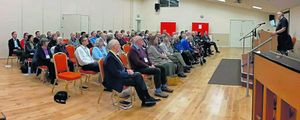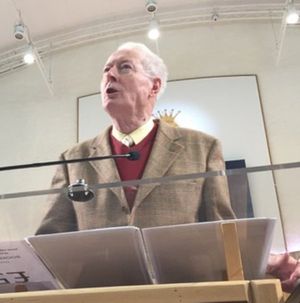Caring for the elderly
When Jesus hung on the cross, he faced incredible pressures. The burden of sin weighed heavily on his holy soul; physical agony racked his body; and the cruel abuses of men and attacks of hell distressed his mind and soul.
In the middle of all this, he thought about his mother and made provision for her future; the Lord committed his mother to his faithful disciple, John (John 19:25-27).
It was a most singular action from which we should learn. Mary was evidently a widow and, as her eldest son, the Lord had the responsibility to provide for her future. In doing this he was fulfilling the requirements of the Fifth Commandment, ‘Honour your father and your mother’.
The implications of this commandment are possibly the least understood of the whole Decalogue. However, it should inform the conduct of believers in regard to elderly parents and relatives and of the local church in regard to elderly people within its congregation.
Growing problem
The care of elderly people is a serious and growing problem in our society. The number of older people will increase significantly over the next few years and the number of very elderly and, particularly, very frail elderly people including those with dementia will expand. This will place massive pressure on the resources of the Government and caring agencies.
This is happening at a time when social services in the community are reducing and local authorities are cutting their care budgets, with funding being squeezed. This has led some authorities to begin to radically reduce their support for older people going into residential care.
Increasingly, when keeping elderly people in their own homes ceases to be possible, they will be encouraged to move to special housing, unless infirm enough to qualify for specialist residential or nursing home care. In Western societies, the responsibility for social care has been largely handed over to government, and the public services are expected to provide. But with reduced government funding, these burdens will fall on families and community agencies like the church.
The example of the Lord with his own mother and the Old Testament principles based on the Fifth Commandment are both encapsulated in teaching given by the apostle Paul in 1 Timothy 5.
Here Paul speaks of ‘widows’. The word signifies ‘loneliness’ and comes from a word that means ‘bereft’, that is, lacking both support and resources (Acts 6). And what Paul says about widows has a wider frame of reference so that it applies to older people in general.
New attitudes
Paul starts by giving a clear statement concerning destitute widows: ‘Give proper recognition to those widows who are really in need’ (1 Timothy 5:3). The NIV translates ‘give proper recognition’ from one word often translated as ‘honour’. It means to respect, revere and value.
This should be expressed in three ways. Firstly, parents (and older people) are to be treated with a respect modelled on the reverence given to God. The Fifth Commandment has a remarkable connection with the First Commandment (Exodus 20:12; Deuteronomy 5:16).
Secondly, it is to be demonstrated by listening to what they say and responding in an appropriate manner (Proverbs 4:1-4; 16:31 — grey hair speaks of wisdom).
Thirdly, they are to be provided for and supported in a practical way. In this there is a significant reversal of roles, from parents acting for children to adult children acting for elderly parents (1 Timothy 5:4; Mark 7:6-13).
Such perspectives are at odds with the prevailing attitudes of our society. While many people are supportive and caring towards parents, the incidence of families ‘forgetting elderly relatives’ or even engaging in some form of ‘elder abuse’ is shockingly high.
More specifically, popular presentations of older people, especially in the media, are almost always negative. Old age speaks of loss, limitation and approaching death; and that makes it something many devalue and disregard.
Thinking through issues
Unfortunately, the predominant attitude to older people in church life can reflect more the world’s perspective than the Bible’s. In a recent conversation, a pastor admitted that in over 25 years of ministry he could only recall preaching one sermon on old age. Yet Titus 2:1-6 makes it clear that older people are specifically to be taught, thereby enabling them to minister to others.
This imbalanced approach has been illustrated by the late John Stott and Billy Graham, who both said they never realised it was necessary to prepare for old age, and how difficult they found the experience. Yet the Bible is full of counsel and instruction for older people.

The failure to address older people’s issues also affects caregivers. I was recently asked if I could recommend a good book for caregivers looking after their elderly relatives.
Sadly, I could identify nothing that was thoroughly biblical and that dealt with all the issues. Yet Paul expected Timothy to teach these very things (1 Timothy 5:7). So we must start where Paul started and change our attitude to old age.
‘Be a thorough Christian, think ahead and do the best for your elderly relatives’. That is the essence of Paul’s instruction to families (1 Timothy 5:4, 16), and it is a direct consequence of the principle of ‘honouring’.
Where Christians fail to do that, they are subject to an awesome condemnation: ‘But if anyone does not provide for his own, and especially for those of his own household, he has denied the faith, and is worse than an unbeliever’ (1 Timothy 5:8).
Real Christianity
Paul does not here mean that every family must look after their elderly parents in their own home. Rather, ‘provide’ implies thinking well ahead and considering all the possible issues, so that the best is done for our elderly folks and they are duly honoured. This is real Christianity.
Older people are not to be seen as an unwelcome burden. We have the privilege of bearing their burdens, as we provide the most suitable provision (Galatians 6). There is to be careful planning to consider the nature of physical care, emotional wellbeing and spiritual help they require. Even should dementia come, these three areas will still be principal features in the needed care.
How sad it is when older people, who served their families well and sacrificially and have given to others throughout their lives, are made to feel guilty because they need support and care in their last days.
Being a caregiver is a demanding role. Many family members struggle to do the best for their elderly relatives and find that their needs are rarely appreciated. In the forward planning that should be undertaken, the needs of the caring family should also be included.
It is important here to comment on one of the most prominent recommendations of the much vaunted Dilnot Report. At a time when the lack of resources means reducing services, and falling standards are being exposed, the report is taken up with limiting the levels of the contribution of older people.
But Paul brings a different perspective. Where there are the financial resources, then there should be no dependence on others. Families should not be tempering what they do with an eye to their own inheritance.
The church’s role
As well as the family, Paul has the church in mind when he calls for those who are widows to be ‘relieved’ (1 Timothy 5:16). The word he uses suggests that this involvement may be financial.
It is interesting to wonder why the Lord committed Mary to the apostle John, and not to one of his own four half-brothers. Was it because they were unbelievers at that time and John was seen as the representative of the church? If so, Jesus anticipated Paul’s teaching on this matter.
Certainly churches should be giving financial support to Christian organisations that provide care facilities for elderly believers. They should also be encouraging members to become volunteers to help older people.
There is no carte blanche for any older person associated with the church to look to the church for automatic help and support; Paul is careful to spell out the godly character expected in those to be helped (1 Timothy 5:5-10).
This is not to exclude the value of help and outreach on a practical level to unbelieving older people, but it is to stress that godliness is to be looked for from believing elderly people. Paul helps the church set criteria for the scope and limits of its support.
As the provision of services to older people in our society becomes more limited and resources increasingly scarce, there will be a wonderful opportunity for the church to shine in the world.
Christian families can show true godliness as they provide for and support their elderly relatives. Churches can demonstrate Christian love to frail elderly people. More than that, we will follow Jesus’s personal example; and there is no better witness than that.
Before being in pastoral ministry, the author was a director of Age Concern in Birmingham and managed the largest provision for Alzheimer’s’ sufferers in the UK He is also a trustee of the Pilgrims’ Friend Society
Roger Hitchings





















